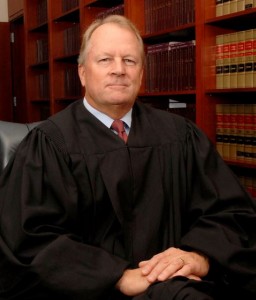[ALSO TODAY: A federal judge tells Narconon to go fish; an update on the Oklahoma drug rehab bill; more American press outrage about Scientology in Vietnam; and Irish protest against Tom Cruise!]
Vance, now we begin Book Three, “Therapy,” and switch gears.
First, there’s a brief chapter in which Hubbard assures us that what we’re about to learn is worthwhile and effective. And also, he points out, it’s something for the masses.
To emphasize that notion, Hubbard engages in some very characteristic anti-intellectual grousing. If it were up to the professional classes, he complains, nothing as complex and useful as Dianetics would go unlegislated into nonexistence.
To cement that idea, however, Hubbard provides a thumbnail description of his therapy which we found very telling…
Such laws would put all men of good will who lend a sympathetic ear to a friend’s troubles inside the barbed wire.
Do you see what he almost did there? Hubbard comes awfully close to revealing what the “wins” and “gains” of Dianetics and Scientology are really all about — a person lending a sympathetic ear to a friend’s troubles.
Of course, if he continued down that line, Hubbard might have to admit that wrapping his talking cure in science fiction hoo-ha like engrams and the reactive mind was just a way to make people more suggestible to magical results.
Instead, Hubbard thunders against the pointy-headed regulators…
Dianetics is not psychiatry. It is not psycho-analysis. It is not psychology. It is not personal relations. It is not hypnotism. It is a science of mind and needs about as much licensing and regulation as the application of the science of physics.
Well, you just know when Hubbard gets this emphatic, pretty much the opposite of what he’s saying is true. And sure enough, Scientology auditing does have elements of hypnotism and psychoanalysis, and has nothing in common with a legitimate science like physics.
Or have we simply become too cynical this far into the book, Vance?
VANCE: I first read Dianetics when I was fifteen years old, and this type of thing sounded great. Here we have a science. So, it’s reliable. And it’s relatively easy to learn. I desperately wanted it to be true. I wasn’t looking for a get-rich-quick scheme. I was looking for an escape-my-self-loathing-and-depression scheme. This Dianetics stuff sounded like just the thing I needed. Talk about desperation.
And I was thinking of this as a career. I could quickly learn to be an auditor and then make a living helping other people. Compare that to going to university for twelve years to become a psychiatrist, the only benefit of which is prestige. Hubbard’s anti-institutionalism definitely resonated in my juvenile brain. Hey, how hard can it be to help people overcome their problems and change their minds for the better? I really had no idea! But notice how Dianetics doesn’t merely prey on people’s desire for answers to their own personal problems. It preys on people’s desire to help others. For whatever reason, that seems particularly evil to me now. If only the Internet had come around ten years earlier, my life might have been quite different. Oh well, things are looking good now.
THE BUNKER: There’s another short chapter that follows, “Release or Clear,” and the thing we found most interesting in it was a lengthy definition of a clear…
A clear, for instance, has complete recall of everything which has ever happened to him or anything he has ever studied. He does mental computations, such as those of chess, for example, which a normal would do in half an hour, in ten or fifteen seconds. He does not think “vocally” but spontaneously. There are no demon circuits in his mind except those which it might amuse him to set up — and break down again — to care for various approaches to living. He is entirely self-determined. And his creative imagination is high. He can do a swift study of anything within his intellectual capacity, which is inherent, and the study would be the equivalent to him of a year or two of training when he was “normal.” His vigor, persistence and tenacity to life are very much higher than anyone has thought possible.
Well, already we’re seeing the goalposts becoming fuzzy. Earlier, Hubbard had said the clear never catches colds or other “psycho-somatic” illnesses (which is just about all of them, in Hubbard’s view). Now, a clear is someone who is “self-determined” and has an active imagination. Suddenly this is feeling a lot more like a motivational seminar and less like a course in miracles.
VANCE: Yeah, even at the best (worst) of times, I always felt shortchanged by Hubbard’s description of a clear. I was looking for a definition, as in a bright-line test that would tell us (a) who is a clear and (b) who isn’t a clear. Hubbard’s description of a clear doesn’t get us there. And so we’re left wondering what a clear really is.
Nevertheless, this is where I went with it. I figured that Hubbard’s description of clear goes far beyond my abilities. So, I knew I wasn’t clear. And yet he promises that his techniques will bring a person to the point of having these abilities (at the very least in that person’s own estimation if not objectively). I must admit that, after making a decades-long, financially ruinous attempt at achieving clear, I’m having doubts about the effectiveness of Hubbard’s techniques. Sorry if I’m dashing your hopes.
When you consider the super-abilities that Hubbard assigns to a clear, I’m completely mystified that anybody would ever allow themselves to be called a clear, much less claim it for themselves. In other words, for somebody to claim being clear, they’d either have to be delusional or a big fat liar! I’m glad I never split from reality that preposterously, not that I didn’t try my best. (Hey, if you don’t allow me this little happiness, I got nothing.)
THE BUNKER: OK, well we definitely have two weak chapters to begin the section on therapy. Let’s hope things pick up next week!
Next week — Dianetics: Your Life Was Ruined Before Birth by Your Parents and Their Dumb Culture
—————-
FEDERAL JUDGE JAMES WHITTEMORE TELLS NARCONON TO GO FISH
There’s been an interesting conclusion to a Florida lawsuit that we’ve been keeping an eye on. The Tampa Bay Times wrote about it yesterday, but as in other stories by the newspaper, they’ve left out the most interesting character in this little drama: wealthy “super powered” Scientologist, Kurt Feshbach.We’ll try our best to quickly recap the lawsuit and its rather surprising end. Kurt Feshbach is one of three brothers who made up one of the most legendary families in Scientology. Wealthy and notorious short-sellers in the 1980s, the Feshbach brothers gave millions to the church, and were rewarded with first crack at the “Super Power” rundowns being developed in the early 1990s. Skip to 2008, when Kurt started up a new Scientology-based drug rehab facility (Narconon Spring Hill) in Hernando County, Florida, on three acres of land he owned through his company Toucan Partners, LLC. Tax filings show that Feshbach left his position as president of Narconon Spring Hill, but the facility still pays him rent ($180,000 in 2010). Narconon Spring Hill is a modest operation, with room for only 22 beds and annual program revenue (in 2010) of $1.3 million. (By contrast, the flagship Narconon operation in Oklahoma generates about $10 million in annual program revenue.)
In 2009, Toucan Partners and Narconon Spring Hill sought county permission to expand. When the county refused, Toucan and Narconon sued, claiming discrimination against people with disabilities (meaning the addicts in the program). We became interested in the case when we found out that Narconon’s attorneys were trying to keep the jury from hearing about Narconon’s connections with Scientology and the deaths at the Narconon facility in Oklahoma (the first request was denied, the second granted). On January 1 of this year, a jury found that the county had indeed discriminated against Narconon Spring Hill, but not against Toucan Partners. And although the plaintiffs had been seeking millions in damages, the jury awarded Narconon Spring Hill only $74,000. County executives couldn’t hide their relief that the amount was so low.
Now, federal judge James Whittemore has finalized the case by further refusing Narconon’s request for injunctive relief — the drug rehab center had reasoned that since it had proved discrimination, the judge should award it the special permit to expand that it had originally been seeking. But Whittemore denied that request, saying that Narconon had violated local rules by not properly seeking the injunctive relief. Apparently, it was Toucan Partners that had asked for the special permit to be granted, but Toucan, the judge pointed out, had lost. And Narconon couldn’t be awarded what Toucan had lost. One attorney friend tells us it looks like a rookie mistake by Narconon’s attorneys, and Whittemore appears to be the kind of judge who doesn’t like rookie mistakes.
In fact, Whittemore is the same federal judge who is hearing the Luis Garcia fraud lawsuit against the Church of Scientology, and as we reported earlier, Whittemore has already proved to be a no-nonsense type with little patience for Scientology’s traditional court shenanigans.
The upshot seems to be that Narconon Spring Hill (which has been renamed Suncoast Rehabilitation Center) comes away with the small $74,000 award, and will now have to apply all over again to the county for permission to expand. But in the time since it last made that request, there’s been a tidal wave of bad publicity about the Narconon program and how it operates, and that news apparently seems to be getting to Florida officials. It’s an interesting situation, and we’ll keep an eye on it.
Here’s Judge Whittemore’s order…
Toucan vs Hernando Final Order
—————-
Oklahoma Drug Rehab Bill Update
We talked yesterday with Oklahoma Rep. Jason Murphey about the current situation with legislation that could be troublesome for Scientology’s flagship drug rehab center in that state. On Tuesday, we reported that Senate Bill 295 had passed the House’s Public Health Committee and is headed for a full House vote (it had previously passed unanimously in the State Senate). While the bill was in the Public Health Committee, however, it picked up an amendment by Rep. Doug Cox, who is a physician. Murphey tells us that Cox had concerns about how the bill might affect faith-based rehab programs, which is why he amended the bill. (Narconon, despite its connections to the Church of Scientology, claims not to be a faith-based program.) Murphey also explained that Rep. David Derby introduced a House-based bill (HB 2215) that is a mirror to the original Senate bill. Either bill may eventually become law, but Murphey says he expects the Cox-amended Senate bill to go to a House vote in the next two weeks, and then go back to the Senate for another vote. It’s a complex process, but Murphey says he’s confident the state will have a law that will help state regulators tighten up the rules of Oklahoma’s drug rehab centers.
In the meantime, McAlester News-Capital reporter Jeanne LeFlore has pried a precious response out of Narconon Arrowhead CEO Gary Smith about the maelstrom his facility finds itself in…
Narconon Arrowhead’s CEO says he doesn’t understand why legislators are giving “so much attention” to a bill that gives the state oversight of his facility and others like it.
Narconon Arrowhead CEO Gary Smith said Wednesday his organization has no problems with Senate Bill 295.
“However we do not understand the amount of legislative attention that has been spent on (the bill) when you consider the number of critical issues facing Oklahomans that require legislative solutions,” he said in a statement.
Ah, Gary. After three deaths and the launching of local and state investigations, as well as ten lawsuits and fervent action in the state legislature, it’s a little late for the “what’s the fuss?” ploy.
—————-
Once Again, Scientology in Vietnam Alarms the American Press
A tipster pointed out that the Associated Press has a story out today about Scientology’s “Purification Rundown” gaining a foothold in Vietnam. It looks to us an awful lot like a similar story that the New York Times produced last year. In both cases, the stories are harsh, with strong language about the quack science in the purif’s notions about “detoxification.” The AP’s story makes no bones about it — this is bogus nonsense that is being pushed by the Association for Better Living and Education in order to help spread Scientology in that country.
But here’s our question: If the AP and the Times are clearly outraged that Scientology is targeting a few hundred people in Vietnam, why are they both so bad at covering what the church is doing to thousands in this country?
————–
Sam Domingo, Unleashed!
Former Scientologist Samantha Domingo just pointed out on Facebook this rather amazing image of her that was captured yesterday at the premiere of Tom Cruise’s new movie Oblivion in Dublin.
[The photo was taken by Brendan Donnelly for Demotix.com]
And Pete Griffiths performs rather brilliantly on a local radio show…
————–
Posted by Tony Ortega on April 4, 2013 at 07:00









